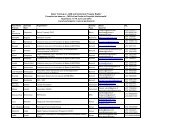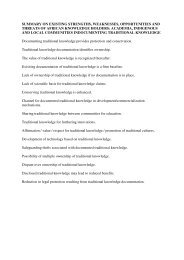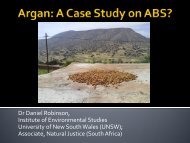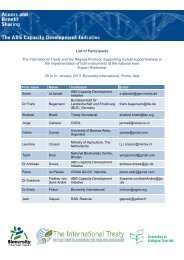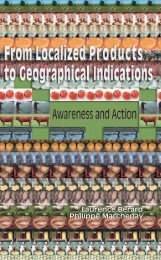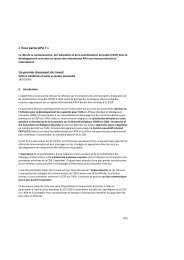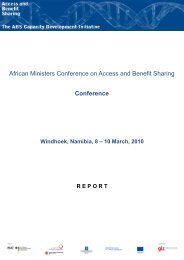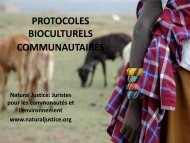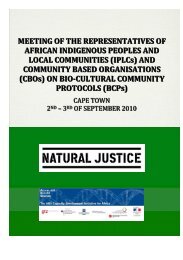The History of Farmers' Rights - Fridtjof Nansens Institutt
The History of Farmers' Rights - Fridtjof Nansens Institutt
The History of Farmers' Rights - Fridtjof Nansens Institutt
Create successful ePaper yourself
Turn your PDF publications into a flip-book with our unique Google optimized e-Paper software.
26 Regine Andersen<br />
Swaminathan, M. S. (ed.) (1996): Agrobiodiversity and Farmers’<br />
<strong>Rights</strong>; Proceedings <strong>of</strong> a Technical Consultation on an Implementation<br />
Framework for Farmers’ <strong>Rights</strong>, (Delhi: Konark Publishers Pvt Ltd).<br />
<strong>The</strong> technical consultation on which this book is based addressed the<br />
issue <strong>of</strong> how the equity provisions <strong>of</strong> the CBD and the concept <strong>of</strong> farmers’<br />
rights could be developed in FAO. Facts and viewpoints were contributed<br />
by experts and stakeholders from many countries, involving representatives<br />
from the plant breeding industry, public sector breeding<br />
institutions, farmers, various international organizations (e.g. FAO, WTO<br />
and UPOV), research institutions and NGOs.<br />
<strong>The</strong> book starts out with a comprehensive background paper prepared by<br />
José Esquinas-Alcázar titled ‘<strong>The</strong> Realization <strong>of</strong> Farmers’ <strong>Rights</strong>’, outlining<br />
the rationale for farmers’ rights, a list <strong>of</strong> suggested components and<br />
the state <strong>of</strong> negotiations. One <strong>of</strong> the conclusions is that present inequities<br />
will increase and current forces driving genetic erosion most likely be<br />
magnified if farmers’ rights are not implemented at the international level<br />
(p.15).<br />
<strong>The</strong> volume proceeds with a section on the national and international context<br />
<strong>of</strong> farmers’ rights as seen from highly different perspectives, before it<br />
focuses on the relationship between plant variety protection and the CBD.<br />
In the latter context the current status <strong>of</strong> plant variety protection in<br />
several countries in the South and the North is highlighted. On this basis,<br />
viewpoints from private and public plant breeding institutions are presented,<br />
and then the views <strong>of</strong> tribal and rural farmer-conservers are<br />
highlighted. A need for resource centres on farmers’ rights is identified.<br />
In conclusion, detailed recommendations are presented. It is recommended<br />
that farmers’ rights should involve the free choice <strong>of</strong>, and access to,<br />
germplasm; the freedom to sell harvested produce and to improve cultivars;<br />
the ability to influence future breeding efforts; access to technologies<br />
and training; the ability <strong>of</strong> farming communities to control access to<br />
agrobiodiversity under their custodianship; economic incentives to continue<br />
to conserve agrobiodiversity; and recognition <strong>of</strong> past and present<br />
achievements (pp. 193–195). Concrete steps are suggested, inter alia in<br />
terms <strong>of</strong> the development <strong>of</strong> national legislation and with regard to<br />
negotiations at the international level.<br />
***<br />
Cleveland, David A. & Stephen C. Murray (1997): <strong>The</strong> World’s Crop<br />
Genetic Resources and the <strong>Rights</strong> <strong>of</strong> Indigenous Farmers’, Current<br />
Anthropology, Vol. 38, No. 4.<br />
This article explores some theoretical and empirical aspects <strong>of</strong> the debate<br />
on intellectual property rights for traditional farmers. <strong>The</strong> authors conclude<br />
that traditional farmers have their own concepts <strong>of</strong> intellectual<br />
property rights in folk varieties <strong>of</strong> plants, and that these differ considerably<br />
from the intellectual property rights applied in commercial agriculture.<br />
<strong>The</strong>y moot the possibility <strong>of</strong> taking advantage <strong>of</strong> the discourse on




